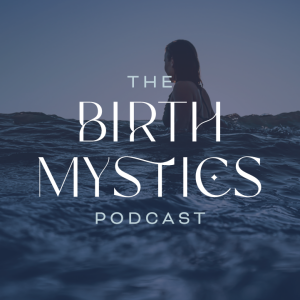
Wednesday Sep 14, 2022
Be Here Now
Katie guides us through a discussion about the power of presence and what that can do for your birth. Living in the present moment is one of the greatest gifts birth can give you. Mindfulness is the ability to be in this moment without allowing distractions to pull you out of that focus. You can imagine your thoughts as a river that can sometimes sweep us up into its current. Mindfulness teaches us to pull ourselves above the water in order to observe and watch it pass, helping us realize that we are not our thoughts. There is an important aspect of non-judgment in that process.
One birth doula client that Katie worked with was having a hard time and often asking when she could start pushing, or how many contractions she was going to have to go through. She still did it. She had a fine birth experience. So it doesn't mean that not being mindful during birth will make everything terrible and horrible. Sometimes the shifts are subtle.
If you do the math, generally speaking, every 3 minutes you'll have a 1 minute contraction, then it's about 15 minutes per hour of contraction for every 45 minutes of calm. Mindfulness can help you embrace that 45 minutes of calm instead of holding onto the contraction that already happened or the contraction that's coming. Your brain doesn't know the difference between what is real and what is imagined, so if you're focusing on the pain of that previous contraction, your brain thinks it's still happening and your physiological response will be the same as if it were.
We often learn in our youth and society that having big emotions is not okay. You're either sent away or shushed or shamed. Learning how to sit with your big emotions is one of the biggest and best things you could do to prepare for birth. Mindfulness is a wonderful tool for doing just that.
Stephanie speaks about the Beginner's Mind. For example, you're eating an avocado. Hold it. Touch it. Smell it. Eventually take a bite and let it sit on your tongue for a moment or two. Chew it. Swallow it. And realize that you've never, ever had that avocado before. It is the only one of its kind. Can you approach it with curiosity? Meeting it without the label and preconceived ideas. How can you apply that to birth?
We're so often stuck in our heads that we don't experience so much of life—the food we eat, the people we love, the places we go. Birth is a powerful opportunity to bring us very, very present. It brings us into our bodies and activates our senses. Katie can still close her eyes and conjure up those same feelings and bodily memories of her births because of how embodied she was.
Katie speaks about how mindfulness can be pivotal in helping you through the last few weeks of pregnancy when you're so tired and tempted to be induced without medical indication. Any form of natural induction that you can try, Katie tried it—spicy burgers, sex, raspberry leaf tea, curb walking, and more. Even so, her baby didn't come until 10 days after the due date. It can be helpful not to announce an exact due date to friends and family so that they don't inadvertently put pressure you in those final weeks. You can consciously choose to be more vague—we're due in the spring or we're due Mid-May. Find ways to be joyful, to be in your body, to celebrate this last stage. Everything is about to change. How can you more fully engage in those moments?
Stephanie remembers her obsessions with infant mile-markers with her first baby. She couldn't wait for her daughter to grow up and learn the next new thing, to the point that she didn't fully enjoy each moment. By the time she had her fourth baby, she learned to slow down and savor her little baby and not want him to grow up too fast.
Curiosity is a key component of mindfulness. It's not rose-colored glasses. It's not having a critical eye. It's just being open and full of wonder with each new experience. Children are naturally mindful. Stephanie shares a memory of taking a walk with her son. He kept stopping and getting distracted. At one point, Stephanie was scolding him until she realized that he was smelling a rose. She stopped in her tracks. Why would a mother ever tell her son to stop stopping to smell the roses? He didn't have the problem—Stephanie did. So she chose to meet him there in the place of wonder instead of trying to pull him into her way of living.
Mindfulness doesn't make everything blissful. Instead it can help you learn how to cope during the difficult times and how to be fully engaged in the most pleasant of times. Consider postpartum and all of the strange and sometimes scary thoughts that can pop into our minds. Instead of identifying as those thoughts, we can instead see that our brain is trying to cope, is sleep-deprived, and you're under a great deal of stress. You can create distance between YOU and your thoughts—they do not define you. The thoughts are actually neutral, and it's what we do or the actions we take that matter. Non-attachment helps us let go of extreme thinking and invite possibilities.
Sources Cited: the poem "Living in the Now" by Vanessa Hughes
If you'd like to learn more please visit www.freyabirth.com
No comments yet. Be the first to say something!